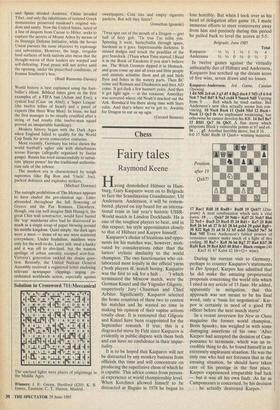Chess
Fairy tales
Raymond Keene Having demolished Hubner in Ham- burg, Gary Kasparov went on to Belgrade to face the Scandinavian Grandmaster, Ulf Andersson. Andersson, it will be remem- bered, played on top board for an interna- tional team in last year's historic USSR- World match in London Docklands. He is one of the toughest players to beat, and in this respect, his style approximates closely to that of Hiibner and Karpov himself.
Kasparov's choice of locations and oppo- nents for his matches was, however, moti- vated by considerations other than the latters' stylistic similarity to the world champion. The two functionaries who col- laborated most loyally in the official yarns ('both players ill, match boring, Kasparov was the first to ask for a halt . . . ') which terminated the Moscow match, were the German Kinzel and the Yugoslav Gligoric, respectively Jury Chairman and Chief Arbiter. Significantly, Kasparov selected the home countries of these two to contest his matches and he wasted no time in making his opinion of their supine actions totally clear. It is rumoured that Gligoric and Kinzel have been reappointed for the September rematch. If true, this is a disgraceful move by Fide since Kasparov is evidently in public dispute with them both and can have no confidence in their impar- tiality.
It is to be hoped that Kasparov will not be distracted by any monkey business from officials this time and will concentrate on producing the superlative chess of which he is capable. This advice comes from person- al experience at world championship level. When Korchnoi allowed himself to be distracted at Baguio in 1978 he began to lose horribly. But when I took over as his head of delegation after game 18, I made immense efforts to steer controversy away from him and precisely during this period he pulled back to level the scores at 5-5.
Belgrade, June 1985 Total
V2 4 V2 2
virtually unbeatable duo of Htibner and Andersson, Kasparov has notched up the dream score of five wins, seven draws and no losses.
Kasparov-Andersson: 3rd Game, Catalan Opening.
1 d4 Nf6 2c4 e6 3 g3 d5 4 Bg2 dxc4 5 Nf3 c5 6 0-0 Nc6 7 Ne5 Bd7 8 Na3 cxd4 9 Naxc4 Nd5 Varying from 9 . . . Rc8 which he tried earlier. But Andersson's new idea actually seems less con- vincing. 10 Nxc6 Bxc6 11 Qxd4 Nb4 12 Bxc6+ Nxc6 13 Qc3 16 An unpleasant weakening, but otherwise he cannot develop his KB. 14 Be3 8e7 15 Rfdl Qc7 16 Qb3! A fine move which pinpoints Black's vulnerable points at b7 and e6.
16 . . . g5. Another horrible move, but if 16. . . 0-0 17 Nd6! Bxd6 18 Qxe6 + winning material.
Kasparov
V2 1/2 1 1/2 1
Andersson 1/2 V2 0 1/2 0
In twelve games against the
Position after 19 Qxb7!
17 Racl Rd8 18 Rxd8+ Bxd8 19 Qxb7! (Dia- gram) A neat combination which nets a vital pawn. 19. . . Qxb7 20 Nd6+ Kd7 21 Nxb7 Bb6 22 Nc5+ Bxc5 23 Bxc5 15 24 Rdl+ Kc7 25 Rd6 Re8 26 b4 a6 27 fe h5 28 h4 gxh4 29 pcb4 Rg8+ 30 K12 Rg6 31 a4 14 32 b5 axb5 33tucb5 Ne7 34 Ra6 Nf5 Even Andersson's fabled powers of resistance cannot make much of a fight of this ending. 35 Ra7+ Kc8 36 b6 Rg7 37 Ra4 Kb7 38 Rxf4 Kc6 39 Rc4 Kb5 40 Rb4+ Black resigns (40 . . . Kxc5 41 b7 Kxb4 42 b8=Q+ wins).
During his current visit to Germany, perhaps to counter Kasparov's statements in Der Spiegel, Karpov has admitted that he did make the amazing proprietorial proposals concerning the world title which I cited in my article of 15 June. He added, apparently in mitigation, that this approach was not meant to be his final word, only a 'basis for negotiation'. Kar- pov is certainly in need of a good PR officer before the next match starts!
In a recent inverview for New in Chess magazine the former world champion, Boris Spassky, nas weighed in with some damaging assertions of his own: 'After Karpov had accepted the decision of Cam- pomanes to terminate, which was an in- credible thing to do, he found himself in an extremely unpleasant situation. He was the only one who had not foreseen that in the ensuing situation, he should have taken care of his prestige in the first place. Karpov experienced irreparable bad luck — but it was all his own fault. As far as Campomanes is concerned, by his decision . . he actually destroyed Karpov.'


























































 Previous page
Previous page